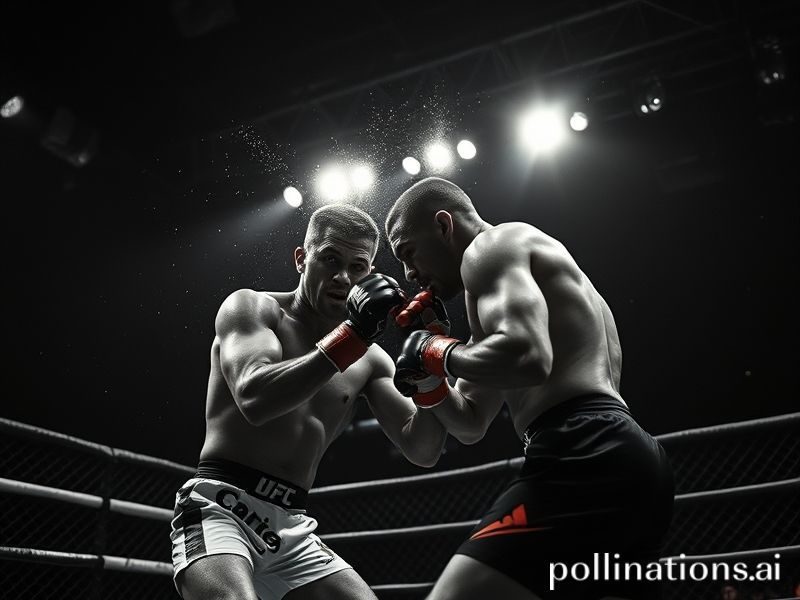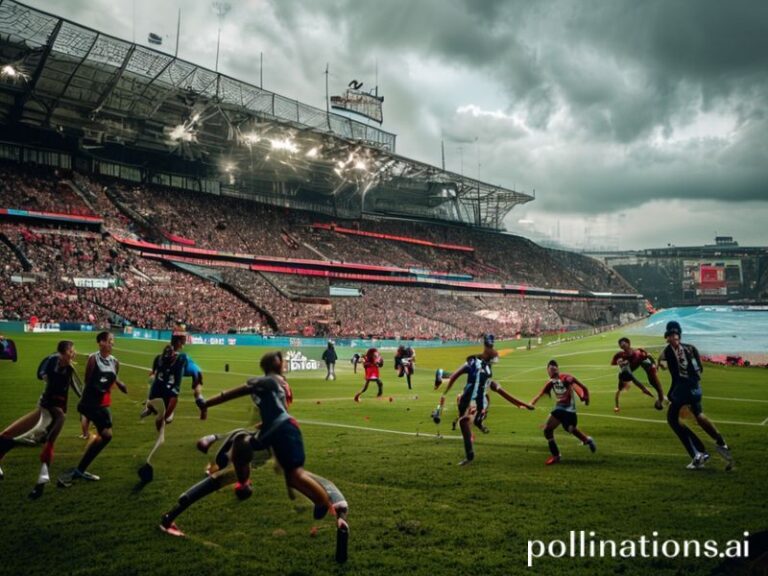Neil Magny’s Global Roadshow: How America’s Nicest Assassin Sells Soft Power One Head Kick at a Time
Neil Magny and the Thin Blue Glove: How One Welterweight Embodies America’s Export of Controlled Violence
PARIS—At 10:30 p.m. local time, the lights inside Accor Arena dimmed to that particular shade of corporate menace, and Neil Magny strode into the octagon looking like a man who had misplaced both his anxiety and his razor. A polite 36-year-old father of two from Chicago, Magny fights with the demeanor of an accountant who just discovered his quarterly bonus is contingent on roundhouse kicks. To most of the 15,000 French spectators, he was simply “the American,” interchangeable with the last one and the next. Yet Magny—now the winningest welterweight in UFC history—carries a passport more potent than diplomatic leather: he exports, in tidy five-minute installments, the United States’ most reliable soft-power product since the hamburger franchise—sanctioned violence, shrink-wrapped for global streaming.
The world watches because the world has learned to monetize its own attention deficit. Magny’s 21 UFC victories are not merely statistics; they are quarterly KPIs for Endeavor Group Holdings, the Beverly Hills conglomerate that also owns Miss Universe and half of Hollywood’s self-esteem. Every time Magny jabs a Latvian prospect into cognitive dissonance, Disney+ and Tencent tally new subscribers in Jakarta, Lagos, and that one guy in Reykjavik who swears MMA is “just like Viking chess.” In a geopolitical climate where embargoes are back in vogue and trade routes get torpedoed for sport, the UFC’s supply chain of bruised shins remains miraculously tariff-free.
Magny himself is the kind of American success story that glows on investor calls but reads like a cautionary tale up close. Raised in Brooklyn by Haitian parents who fled the Duvalier aftermath—an exodus whose emotional baggage is still circling over JFK—he joined the Army National Guard to pay for college, discovered mixed martial arts between guard shifts, and now flies Old Glory into cages from São Paulo to Abu Dhabi. Somewhere in that résumé lies a masterclass in how to convert imperial uncertainty into compound interest: Uncle Sam teaches you to wrestle, Dana White teaches you to sell pay-per-views, and suddenly you’re the face of freedom wearing four-ounce gloves stitched in Pakistan.
The French crowd, historically allergic to American military swagger, cheers anyway. Partly because Magny fights like a man trying to file his taxes mid-hurricane—methodical, slightly irritated, inexplicably effective—and partly because France is currently debating whether to raise its own retirement age or simply let the elderly fight in cages for supplemental income. In that context, Magny’s durability becomes inspirational: 46 professional rounds and still no sign of a hip replacement. Liberté, égalité, rétablissement.
But the broader significance lies in the peripheral metrics. Each Magny bout generates terabytes of biometric data—heart-rate variability, strike velocity, cortisol spikes—that are quietly vacuumed up by wearable-tech partners and sold to insurance actuaries from Zurich to Singapore. Your smartwatch knows how hard Magny’s left calf twitched at 3:47 of round two, and that knowledge will eventually determine your premium on a policy you haven’t even bought yet. The octagon is merely the loss-leader; the real revenue is harvested from our communal adrenaline, refined into actuarial tables and geopolitical hedging strategies. If that sounds dystopian, remember we voluntarily strap the sensors to our own wrists—cheaper than therapy, more accurate than polling.
Backstage, Magny gives interviews in three languages, none of them his parents’ Creole. He speaks fluent Sponsorese, the Esperanto of modern athletics, thanking Monster Energy and the U.S. Army in the same breath. The irony, of course, is that the Army once paid him to defend borders he now crosses for a living. Somewhere a Pentagon strategist is updating a white paper titled “Force Projection Via Pay-Per-View,” while a Chinese streaming platform adds Mandarin subtitles to his post-fight sermon about hard work and clean living. Soft power, hard elbows—same difference.
When the final horn sounds and the French DJ cues up whatever passes for EDM this fiscal quarter, Magny raises gloved hands to a crowd that will forget his name by breakfast. He exits through a tunnel plastered with crypto-exchange logos, already scheduled to headline in Singapore six weeks later, because the supply chain of controlled violence never sleeps. And somewhere over the Atlantic, his next opponent is studying tape, wondering why the American looks so calm, so polite, so utterly devoid of existential dread.
The answer, of course, is that dread is inefficient. It doesn’t travel well, incurs customs fees, and tests poorly with key demographics. Neil Magny has learned what empires have always known: the most profitable export is the one that looks like a sport but feels like certainty.







